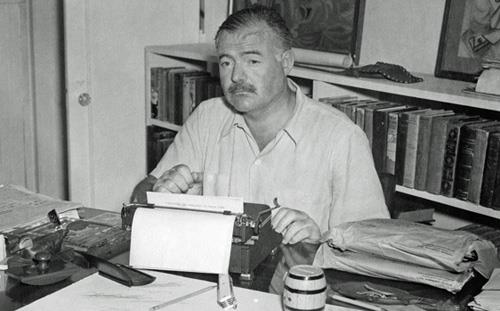
The sun also sets on literary reputations, especially when a famous writer's flamboyant lifestyle and personal peccadilloes threaten to overwhelm the work for which he became famous.
If Ernest Hemingway had few critics at the time he was forging his literary reputation as an author of distinction – many of whose works are considered classics of American literature – he's certainly made up for that since. History has tarnished the Hemingway legend to the extent that it's hard today not to view Hemingway the man as a relic of a past age, as the Guardian writer and editor Martin Pengelly put it, "Too white, too male, too privileged."
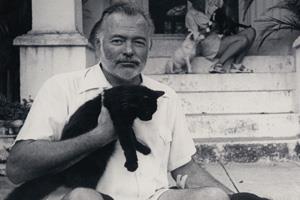 Hemingway, Ken Burns and Lynn Novick's three-night, six-hour documentary profile that strives to remind viewers both of the greatness of Hemingway's work and his shortcomings as a public figure and role model to an entire generation of would-be writers must have seemed a daunting challenge.
Hemingway, Ken Burns and Lynn Novick's three-night, six-hour documentary profile that strives to remind viewers both of the greatness of Hemingway's work and his shortcomings as a public figure and role model to an entire generation of would-be writers must have seemed a daunting challenge.
"There's a really short distance between terrifying and exhilarating," Burns said during a recent press event. "That's where you have to live."
Burns and Novick have never shied away from opposing points-of-view and all-too-human emotions in their earlier film collaborations, from Baseball, Jazz, and Frank Lloyd Wright to Prohibition and The Vietnam War. Far from seeing the apparent dichotomy as daunting, Burns saw it as more opportunity than challenge.
One cannot exist without the other, Burns insists.
"We were drawn to trying to get at a real Hemingway," he said. "I think the persona of the wild man, the drunk, the bar guy, the big-game hunter, the big-sea fisherman is what we inherit, the baggage we carry.
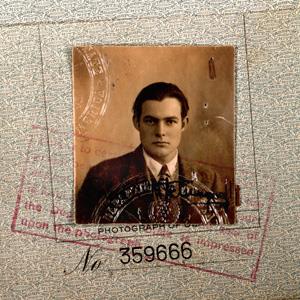 "But almost immediately, we began to see how thin and frail that persona was, not just for him but in fact. I don't think Hemingway would have survived if that's all he was — this barroom guy. He had the discipline to write every single day, but he also had all these other things competing under the surface . . . There's really one fundamental question in all this: what works, period. Does it work? Period."
"But almost immediately, we began to see how thin and frail that persona was, not just for him but in fact. I don't think Hemingway would have survived if that's all he was — this barroom guy. He had the discipline to write every single day, but he also had all these other things competing under the surface . . . There's really one fundamental question in all this: what works, period. Does it work? Period."
Novick concurred.
"The public persona became a burden for him," she said. "It becomes exhausting, as someone says in the film, to be Hemingway after a while.
"It was wonderful for us to discover him young before he became this stereotype, this icon, when he was a young man at the beginning of his career . . . the kind of energy and discipline he had that he tried to carry through to his later years, and how difficult it became as he got older, trying to live up to the image he created for himself, and the tragedy that followed."
Novick pointed out the Hemingway project was decades in the making, and not just the relatively short window between Burns' last project and this one.
"That often happens," Novick said. "The gestation period of these projects can be very long, depending on what other projects we're working on at the time.
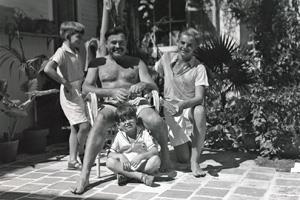 "The first interview we filmed was Patrick Hemingway, his son, who is still alive. He's 90. He was in his mid-80s when we did the interview in 2014. We were working on our Vietnam series, but we felt that if we were going to do Hemingway we'd better hurry up and film Patrick while he was ready, willing, and able to be filmed.
"The first interview we filmed was Patrick Hemingway, his son, who is still alive. He's 90. He was in his mid-80s when we did the interview in 2014. We were working on our Vietnam series, but we felt that if we were going to do Hemingway we'd better hurry up and film Patrick while he was ready, willing, and able to be filmed.
"So, it does take a long time. But it gave us time to read and reread, if we hadn't already, everything we could get our hands-on, by Hemingway and about Hemingway. We did a deep dive long before we started production."
As with so many of Burns' expansive, big-picture biographical essays, Hemingway is at heart a personal story about life in all its complexity, with all ambiguities and contradictions, good and bad, with all the beauty and ugliness intact.
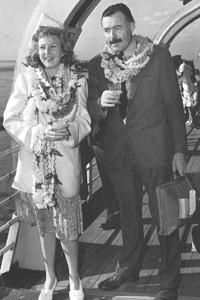 "This is a man whose life ends very tragically by his own hand," Burns explained. "People have expounded on that in all sorts of different ways: the genetics, the madness that existed in his family; his own father's suicide, the ideation that that produced in him.
"This is a man whose life ends very tragically by his own hand," Burns explained. "People have expounded on that in all sorts of different ways: the genetics, the madness that existed in his family; his own father's suicide, the ideation that that produced in him.
"One of the things we discuss, that's new, are these traumatic brain injuries he suffered throughout his life. Serious things that we know now cause the kinds of frailties, the alcoholism, and the drug addiction that can add to madness and mania that he clearly had. I think that helps reverse this sense that we know who he was — this conventional wisdom about Hemingway.
"We're not going to be bold enough to say that this is the one thing that did it, that pulled the trigger, literally and figuratively. It's a whole, complex set of factors.
"It's incumbent on us, particularly in a media culture that wishes everything to be binary, good or bad, to understand that nothing in life is either good or bad. We all exist in this complicated gray area.
"In many ways this is the most adult film I've made, to learn how complicated it is to be able to tolerate contradiction, to understand that he could be one thing and the opposite of that thing at the same time."
•
Hemingway premieres Monday, April 5 through April 7 on PBS at 8 ET (check local listings).